Hello Oscar, eh!
Essay: Hello Oscar, eh!
by Ron Verzuh
*

Which Canadian won the country’s first Oscar? Best actor? Best supporting? Best documentary? Best live action short? Best animation? Best original song? I didn’t know either. Get ready for some surprises. Since the Oscars began in 1927, Canadians have been getting nominated and sometimes winning in most of the categories. Some have even been from British Columbia. With the 2024 Academy Awards on March 10, let’s review the legacy of Canadian winners.
Toronto-born Mary Pickford, “America’s Sweetheart” in the silent film era, won our first Oscar for best actress in 1928-29 for Coquette, a pre-Hayes Code southern love intrigue. Norma Shearer, born in Montreal, got multiple nominations the following year and won for The Divorcee. Marie Dressler from Cobourg, Ontario, won a year later for the pre-Code comedy-drama Min and Bill, based on a novel by Lorna Moon.
Although Toronto-born Walter Huston, father of storied director John Huston, was nominated in 1936 for Dodsworth, based on the Sinclair Lewis novel, in the best actor category, the prize didn’t travel north until Brendan Fraser, a dual citizenship holder, won for The Whale in 2022.
Harold Russell, born in North Sydney, Nova Scotia, was the first Canadian to win the Oscar for best supporting actor in 1946 for The Best Years of Our Lives, a drama about three soldiers adjusting to civilian life, and Huston came back in 1948 to win for The Treasure of the Sierra Madre directed by his son. In 2011, Christopher Plummer won for the romantic comedy-drama Beginners, the oldest Canadian to do so.
In 1943, Quebec City-born actress Lucile Watson was the first Canadian nominated in the best supporting actress category. She didn’t win for Watch on the Rhine. That honour went to Anna Paquin in 1993 for The Piano, New Zealand director Jane Campion’s historical drama about a mute Scottish woman in wilderness N.Z.
Chris Williams, another duel citizen, shared the award in 2014 for best animated feature with Big Hero 6, a Disney-produced superhero film. He was nominated again in 2022 for The Sea Beast, an adventure film.
In 1949 through 1951, Gerald Bosustow got multiple nominations in the best animated short category for Gerald McBoing-Boing, about a boy who speaks through sound effects. It was based on a Dr, Seuss story. Bosustow won twice again in the 1953-57 period for When Magoo Flew (1954) and Magoo’s Puddle Jumper (1956). Both films are about the adventures of a near-sighted older man.
The wins continued in 1972 with Toronto-born Richard Williams’s A Christmas Carol. Canadian-Dutch NFB filmmaker Co Heodeman’s won in 1977 for The Sand Castle, about a humanoid sand person. Belleville, Ontario-born director John Weldon, another NFB regular, shared the Oscar in 1978 for Special Delivery, about a dead postal worker. There were more Oscars in this category ran from 1980 to 2018, including Frederic Back of the CBC for Crac (1980), about the experiences of a rocking chair, and Domee Shi, a Chinese-Canadian director for Bao (2018), about a bun that comes alive.
Canada has never won an Oscar for best cinematography or best costume design.
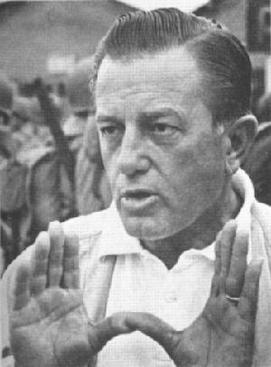
James Cameron won the best director statue for Titanic in 1997. From 1947, the category attracted some impressive directorial talent as well as some controversial nominees. Perhaps our most notable BC winner was Grand-Forks-born Edward Dmytryk. He was the first Canadian-born director to be nominated for best director (Crossfire 1948). He was also nominated for The Caine Mutiny (best picture 1954), but his most famous public role might have been as a member of the Hollywood Ten, the group of filmmakers who were blacklisted as communists during the Cold War. Dmytryk turned on the other nine and named names before the House Committee on UnAmerican Activities (HUAC) in 1951.
Ottawa-born Frank “Budge” Crawley won best documentary feature for The Man Who Skied Down Everest (1975). Joe Zaritsky of St. Catherines, Ontario, won for Just Another Missing Kid (1982). Brigette Berman, a German-born Canadian won in 1987 for Artie Shaw: Time is All You’ve Got, about the American jazz clarinetist and 1930s big band leader.
Halifax-born Michael Donovan shared the award with Michael Moore in 2002 for Bowling for Columbine. Moore narrated the feature about the Columbine high school massacre in Colorado in 1999. In 2022, Toronto’s Daniel Roher shared the Oscar for Navalny. At this year’s Oscars ceremony we will no doubt salute the Russian opposition activist Alexei Navalny, who was killed in February 2024 while in a Russian prison.
Canada’s first Oscar win for best short documentary went to was Stuart Legg for a National Film Board of Canada short called Churchill’s Island (1941). The NFB seems to have been the only Canadian connection to this 18-minute story of an epic battle between the Royal Air Force and the Luftwaffe. Norman McLaren, our most celebrated documentarian, won for Neighbours in 1952. This delightful commentary about two neighbours who go to war against each other is as relevant today as ever.
Then there was a long Oscar drought before Terry Nash shared a win for If You Love This Planet in 1982. Cynthia Scott shared the statue in 1983 for Flamenco at 5:15 and Ben Proudfoot won for The Queen of Basketball (2022). Canada didn’t win in the best international feature film category until 1986 when Quebec director Denys Arcand took it for The Barbarian Invasions. It was the first Canadian film to win the award.
Best Canadian live action short film winners included Christopher Chapman of Toronto for his 1968 film A Place to Stand, a “multi-dynamic image technique” that he pioneered, shows several panes of moving images at once. In 1977, Montrealer Beverly Shaffer and Japanese-Canadian Yuki Yoshida won for I’ll Find a Way, about a young girl with spina bifida.
Moving on to best film editing, Regina-born Harmon Jones shared the award for King Solomon’s Mines in 1950. Toronto-born Ralph E. Winters shared the win for Ben-Hur in 1959. Douglas Stewart, born in Vancouver, shared for The Right Stuff in 1983. James Cameron, born in Kapuskasking, Ontario, won in 1997 for Titanic.
In the best picture category, we won in 1964 for My Fair Lady. Well, Jack L. Warner, the Hollywood studio mogul, won and he was born in London, Ontario. Montreal-born Albert S. Ruddy got a statue as producer of The Godfather in 1972, James Cameron won for Titanic in 1997 and Ruddy won again in 2004 for Million Dollar Baby. Paul Haggis won in 2005 for Crash and J. Miles Dale carried away a statue for The Shape of Water in 2017. He was born in Toronto.
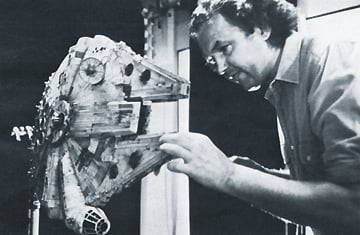
Best make-up and hairstyling went to Michele Burke in 1982 for Quest for Fire and again in 1992 for Bram Stoker’s Dracula. She had six wins from 1982 to 2022. Born in Ireland, she now holds Canadian-American citizenship. Paul LeBlanc shared the Oscar for Amadeus in 1984 and Stephan Dupuis shared for The Fly in 1986. Canadian make-up artist Stephanie Ingram won with The Eyes of Tammy Faye (2021) and Adrien Morot took the award for The Whale (2022).
Canadians have won twice for best original song. Buffy Sainte-Marie in 1982 for “Up Where We Belong” in An Officer and a Gentleman and Howard Shore in 2003 for “Into the West” in The Lord of the Rings: The Return of the King. Buffy’s recent “outing” by the CBC’s The Fifth Estate as a fake Indian did little to discredit her long list of accomplishments, including this Oscar. She has wisely avoided any further media-generated controversy.
We did slightly better in the best original score category with double wins for Howard Shore for The Lord of the Rings: The Fellowship of the Ring in 2001. Shore won for The Lord of the Rings: The Return of the King in 2003. Shore was born in Toronto. In 2012, Winnipegger Mychael Danna won for Life of Pi.
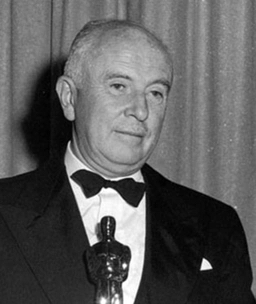
By most standards Victoria-born Richard Day takes the top Canadian award for most Oscars. He won seven of them and was nominated for a further 13 in the category of best art direction. He worked on 265 films between 1923 and 1970. Under best production design, he won for the LillianHelman First World War drama The Dark Angel in 1935 and for Dodsworth the following year. In 1941, he won for How Green Was My Valley, twice in 1942 for the Rita Hayworth musical My Gal Sal and This Above All, a wartime romance film starring Tyrone Power and Joan Fontaine. He shared a win for A Streetcar Named Desire in 1951 and won again in 1954 for On the Waterfront.
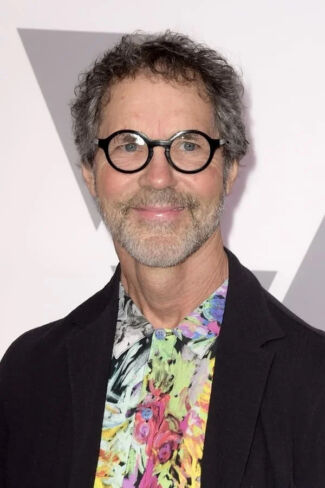
The list of other winners includes Edward G. Boyle of Cobden, Ontario, for The Apartment (shared) in 1960; Vancouverite Dennis Gassner for Bugsy in 1991; Gordon Sim of St. Thomas, Ontario, for Chicago; Jim Erickson, born in Minnesota but moved to Vancouver and Salt Spring Island, for Lincoln (2012); Canadians Shane Vieau, Jeff Melvin and Paul Denham Austerberry (Canadian Filipino) for The Shape of Water (2017); and, Montrealer Patrice Vermette for Dune (2021).
Moving to best sound, Canada won an Oscar in 1929 for The Big House, a pre-Code prison drama starring Wallace Berry, again with the romantic operetta Naughty Marietta with Jeannette MacDonald in 1935 and San Francisco in 1936. In 1940 Montreal’s Douglas Shearer, the elder brother of actress Norma Shearer, won for Strike Up the Band, an American musical. He won again in 1951 for The Great Caruso. Craig Mann of Oakville, Ontario, won in 2014 for the psychological drama Whiplash.
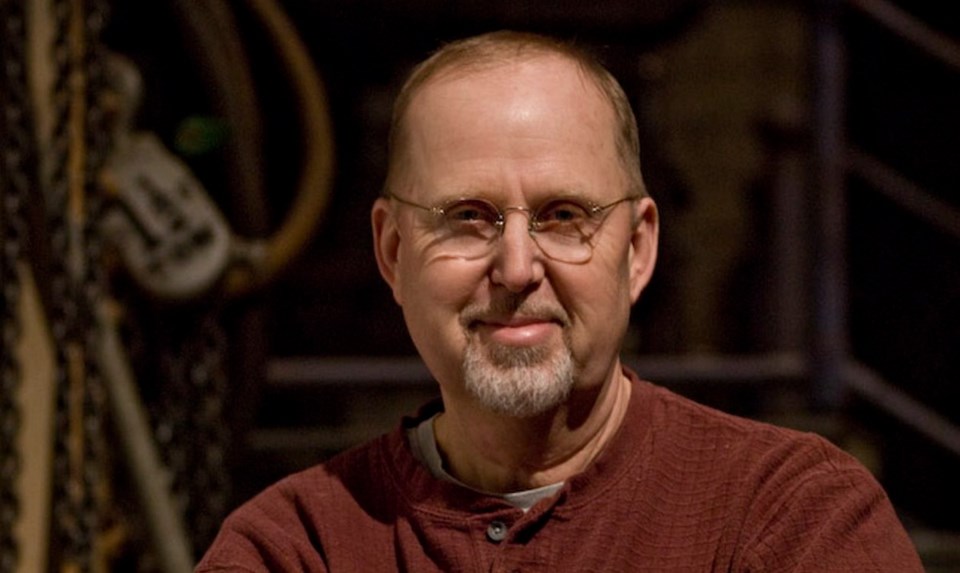
Montreal’s Sylvain Bellemare won for best sound edition in 2016 for the science fiction film Arrival. Canadian Paul Massey shared a win in 2018 for Bohemian Rhapsody, a musical biopic about Freddie Mercury and the band Queen.
Douglas Shearer continued to win Oscars in the best special effects category with Thirty Seconds Over Tokyo in 1944 and sharing for Green Dolphin Street, a disaster drama with Lana Turner in 1947. In best visual effects, Vancouver-born Les Bowie won in 1978 for Superman, Vancouver’s Lorne Peterson won in 1984 for Indiana Jones and the Temple of Doom, Richard Williams in 1988 for Who Framed Roger Rabbit, British-Canadian Tristan Miles shared in 2018 for First Man in which London-Ontario-born Ryan Gosling stars as astronaut Neil Armstrong. Miles share the award with Brian Connor for Dune in 2021.

American-Canadian novelist John Irving won a best adapted screenplay award in 1999 for his book The Cider House Rules and Toronto’s Sarah Polley won for her film Women Talking in 2022. Roger Avary, the Flin Flon, Manitoba screen writer, shared the credits with director Quentin Tarantino in the 1994 hit Pulp Fiction. In 2005, Paul Haggis won for Crash.

Finally, we have the special awards, starting with Danville, Quebec-born Mack Sennett, a Hollywood studio head; Harold Russell for “for bringing hope and courage to his fellow veterans through his appearance in The Best Years of Our Lives; studio head Jack L. Warner; Onna White of Inverness, Nova Scotia, for her choreography in the film Oliver! (1968); Mary Pickford; the NFB for its dedicated commitment to originate artistic, creative and technological activity and excellence in every area of film making”; directors Toronto-born Norman Jewison (In the Heat of the Night 1967, Fiddler on the Roof 1971) and Edmonton-born former CBC director Arthur Hiller (The Americanization of Emily 1964, Plaza Suite 1971); actors Donald Sutherland “for a lifetime of indelible characters, rendered with unwavering truthfulness”; and, Michael J. Fox.
Turning to this year’s nominees, will Ryan Gosling win a best supporting statue for his role in Barbie? Will Ben Proudfoot win for his short documentary The Last Repair Shop? Will the NFB’s Nisha Pahuja get the best feature documentary nod for To Kill a Tiger? Will Quebec’s Vince Rene-Lortie win best live action short for Invincible? Will Celine Song win as the playwright and director of Past Lives in the best original screenplay and best picture category?
Over its 75-year history the Academy of Motion Picture Arts and Sciences has had 369 Canadian nominations and 94 winners, several of them honouring BC talent. It is, indeed a proud legacy that is growing with each new film.
*
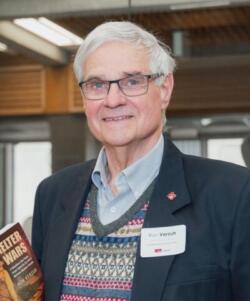
Ron Verzuh is a writer, historian and documentary filmmaker, and a regular contributor to The British Columbia Review. For more information on Canadian actors at the Oscars, see https://www.cbc.ca/arts/a-brief-history-of-canadian-actors-at-the-oscars-1.3460970
*
The British Columbia Review
Interim Editors, 2023-24: Trevor Marc Hughes (non-fiction), Brett Josef Grubisic (fiction)
Publisher: Richard Mackie
Formerly The Ormsby Review, The British Columbia Review is an on-line book review and journal service for BC writers and readers. The Advisory Board now consists of Jean Barman, Wade Davis, Robin Fisher, Barry Gough, Hugh Johnston, Kathy Mezei, Patricia Roy, Maria Tippett, and Graeme Wynn. Provincial Government Patron (since September 2018): Creative BC. Honorary Patron: Yosef Wosk. Scholarly Patron: SFU Graduate Liberal Studies. The British Columbia Review was founded in 2016 by Richard Mackie and Alan Twigg.
“Only connect.” – E.M. Forster
5 comments on “Hello Oscar, eh!”